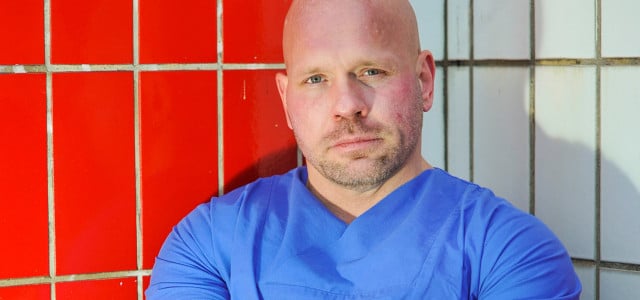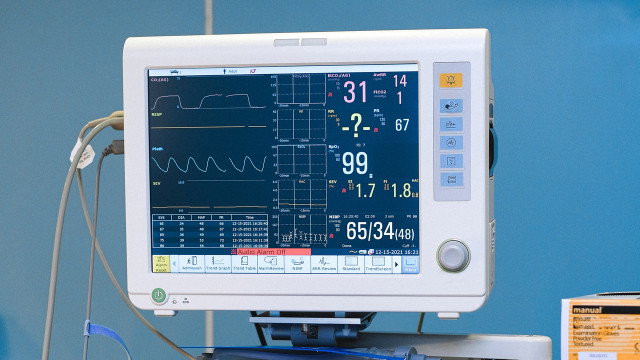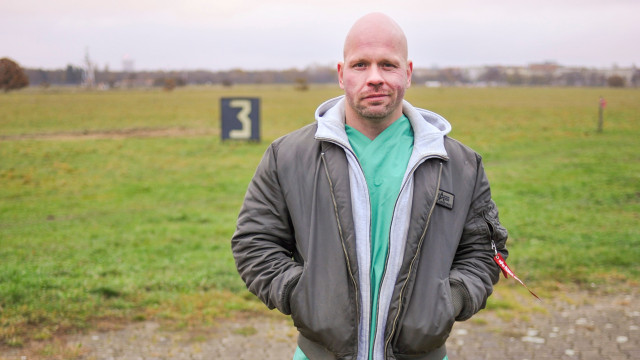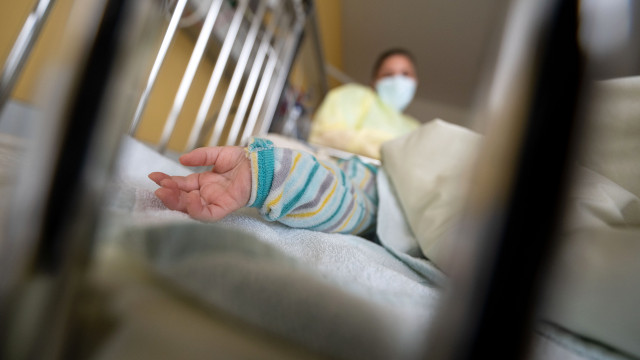
Overcrowded children’s hospitals, overwhelmed nurses and no improvement in sight. In an interview with Utopia, intensive care nurse Ricardo Lange reports on the grueling everyday life in the hospital and calls for a rethink.
Ricardo Lange is Germany’s best-known nurse. He has been working in the intensive care unit for twelve years. When he ranted about health care conditions on Facebook in 2020, his post went viral. This was followed by invitations to the federal press conference, numerous talk shows and with his book “Intensive: When the state of emergency is everyday life” he landed a Spiegel bestseller at the beginning of 2022. He also continues to work tirelessly on social media to remedy the nursing shortage.
In an interview with Utopia, Ricardo Lange gives an insight into the current emergency. He reports on how people die because too few nurses have to take care of too many patients. He explains why, for him, treating his profession is like emotionally raping nurses. And he reveals what needs to happen now so that the health system in Germany doesn’t collapse.
Intensive care nurse Ricardo Lange in an interview with Utopia
Utopia: In early 2020, when the Corona pandemic started, nursing was very much in focus. People stood on their balconies and clapped in solidarity with the nurses. What did this gesture ultimately achieve?
Ricardo Lange: We live in a time when certain media trends are emerging. Sometimes it’s the nursing shortage, sometimes the climate crisis, sometimes the war. But the attention span is short. Back then, caricatures were drawn with nurses as heroes, today people write to me to shut up, after all I chose the job myself. Not much is left of the initial clap…
Utopia: It’s surprising that a nurse of all people is so hostile. Do many people react negatively to your job?
Ricardo Lange: Not all, but many people just don’t give a shit. The main thing is that the shop is running and there are many who say “Stop whining!” or “Quit!”. The problem is that many do just that. They leave the profession or move away from the intensive care unit to a somewhat quieter area.
When resuscitation comes hours late
Utopia: Now you read and hear a lot about the nursing shortage. But very few get to feel it in everyday life. How often does it happen that someone is seriously injured or even dies because there are not enough caregivers?
Ricardo Lange: Often. For example, I once had a case where I was in an intensive care unit and a resuscitation was called.
The ward seeking help, a cardiology department, was totally understaffed. One nurse was responsible for 30 patients alone. He ran back and forth, had to deliver medication, store the patients, help them to the toilet. In short, he was very busy. The doctor then ran to the resuscitation and was back after a minute or two. He then explained to me that the patient already had rigor mortis.
Utopia: what happened?
Ricardo Lange: The ECG cable has come off the body. This sometimes happens when the patient turns. Then there is a beeping signaling that a cable is disconnected. The nurse was not at the monitor, however, but had to run from room to room and do his work there. He only managed to get there two or three hours later. Meanwhile, however, the patient had a heart attack that could not be detected and transmitted because the ECG cable was no longer attached to him.

If there had been enough staff, the heart attack could have been detected early and at least there would have been a chance to help this patient.
“Like an emotional rape”
Utopia: How does it feel to work under these conditions?
Ricardo Lange: That gets you down. You are driven into it by the lack of staff, which is repeatedly ignored. So you go to work knowing that you can’t do everything for the patients and that people will be harmed as a result. It’s depressing.
Caregivers can be emotionally blackmailed. They strike very little because they don’t want to leave the patients alone. You know they keep the place running and you take advantage of the situation. So it’s like emotional rape for me. Harsh words, but they best describe how you feel.
Utopia: What could be done to improve the situation?
Ricardo Lange: You have to change the working conditions. There needs to be a better work-life balance. You have to be able to spend more time with your family, not have to constantly fill in, have time to relax. A burned-out nurse who is on the verge of burnout does not do much for the patient. She loses her ability to concentrate and her empathy.

I would also like it if someone who works shifts could retire at 60, because a healthy lifestyle is not always possible with this type of work and years of life simply go by. Such measures can make the profession so attractive again that people say: cool, care is a great job. I would like to work there again.
Constant stress in the children’s intensive care unit
Utopia: The situation at the children’s hospitals is also very tense at the moment. You once had to help out in a children’s intensive care unit and posted on social media that you would never do that again. Why?
Ricardo Lange: I was completely overwhelmed by these little creatures. The administration of medicines to infants is something completely different than to adults. There it must be calculated exactly on the weight. The vital signs are also different. For example, if an adult’s heart rate goes above 140, alarm bells go off immediately. But sometimes a baby lies in bed with a heart rate of 190 and that is normal. When you get there as an adult carer and have learned that this value is critical, then you are under constant stress.
Also, if I have an emergency situation in the adult intensive care unit, I know exactly how to initiate resuscitation, which medications to use and how the defibrillator works. If that happens to me in the children’s ward, I’m completely helpless. That’s negligent and that’s why I have vowed never again to take responsibility for areas in which I am not trained and educated.
What needs to be done now
Utopia: If you now improve working conditions, it will take at least three years for new nurses to be trained. Do you have any ideas on how to get this acute crisis situation under control in the meantime?
Ricardo Lange: For example, we have many nursing staff who have already left the profession. You’d have to incentivize those nurses to come back through re-entry bonuses, negotiating rosters, and so on. Also, you have to stop screwing up the nurses. There is this corona bonus that so many other professional groups have received, but I, for example, like many of my colleagues, which was used in Covid wards the whole time, have not seen a cent to this day.
Utopia: What would happen if everything stayed the way it is?
Ricardo Lange: Then nurses would continue to quit. Others would leave acutely intense areas and move to calmer areas. And the whole baby boomer generation, the carers and nurses about to retire, would retire. This gap is not easy to fill, and then we would have more frequent situations in the future where politicians tell us that we must not overload the health system because there are no longer any staff.
For example like now with this RS virus or in any other scenarios when many patients come to the clinic at once. We have fewer and fewer opportunities to look after these people adequately because the flight of personnel is not stopped.

We have a lot of well-trained nurses. But what are they doing? They go to Switzerland, to Norway, to Sweden. They are trained here in Germany for a lot of money, they are not taken seriously here and then they say very clearly: Do your shit alone. That’s a pity. On the one hand, all the good nurses are leaving, on the other hand we’re thinking about how we can get new nurses from abroad. That’s absurd.
We have to keep the ones that are still there. Unless we can do that, all efforts to recruit new nurses are meaningless.
“It’s not about appreciation, it’s about human lives”
Utopia: So the main causes are poor working conditions and insufficient appreciation?
Ricardo Lange: I now find the word appreciation really dreadful. It’s not about appreciation, it’s about human lives. Of course, appreciation is a point, but what you shouldn’t forget when you look at the last strikes by nursing staff: They didn’t take to the streets for more money, but for a better staff ratio. For more relief, so that there are more staff on the shift and that patients can be cared for better and more safely again.
All other professions – and that’s perfectly legitimate – are taking to the streets for more money, and healthcare workers are taking to the streets for lives. It’s not about the caregiver getting a pat on the head and being told: “You’re doing a great job!” It’s about people no longer being endangered.
Utopia: What can each individual do to improve this situation?
Ricardo Lange: For example, no longer going to the rescue center because of small things. Anyone who really suspects an emergency should come, of course. But you wouldn’t believe how many people come to the rescue center because of trifles. This is a very important point, because the emergency services are currently totally overloaded.
Also, there’s a lot you can do on social media, you can share posts from a lot of healthcare workers who are involved. You can take part in strikes and demonstrations. You can make your voice loud.
And if you are in the hospital yourself, you can express your dissatisfaction to the nurse, but it would be much better to complain to the hospital management and politicians. Mr. Lauterbach would have to fill them up with so much mail that he no longer knows where the back and the front are. The clinics would have to receive so many complaint emails and letters that their heads would spin. This is the only way to increase the pressure for something to actually happen and that would relieve us of a lot of work.
Read more on Techzle.com:
- New alliance warns: The rescue service is collapsing
- These 8 Common Mistakes Make Colds Worse
- Dry throat: The most effective home remedies